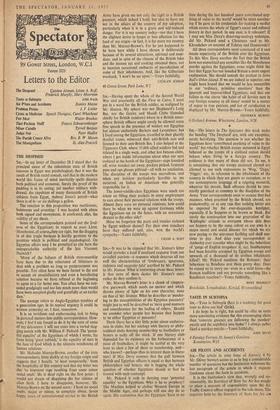SIR,—Having spent the whole of the Second World War and
practically all the First in Cairo, I must put in a word for the British soldier, so maligned by Mr. Jesman. My sphere was not Shepheard's Long Bar, nor the Gezira and Maadi Clubs (founded chiefly for British residents) where in a British atmo- sphere British officers might surely be allowed some free speech in the presence of waiters not Egyptian but almost exclusively Berbers and Levantines; but I lived among the Egyptians, travelled in their ghastly derelict trams, witnessed their anti-British acts and listened to their anti-British lies. I also helped at the Tipperary Club, where 35,000 allied soldiers fed and relaxed in a single week, and other less famous clubs, where I got inside information about what our men endured at the hands of the Egyptians—caps knocked off, wrist watches cut away, pockets picked, fountain pens and sun glasses pilfered—all with no retaliation. The discipline of the troops was marvellous, and when any incident particularly horrible to me occurred, an Indian or American was generally responsible for it.
The lower-middle-class Egyptians were much too intent on filling their pockets in army employment to care about their personal relations with the troops. Almost there were no personal relations; how could there be when we were up against Germany while the Egyptians sat on the fence. with an occasional descent to the other side?
Have we forgotten the pacts and treaties violated by Egypt without shame? For their own treachery have they suffered and, alas, won the world's sympathy.—Yours faithfully,
LILIAN A. ROFP


































 Previous page
Previous page